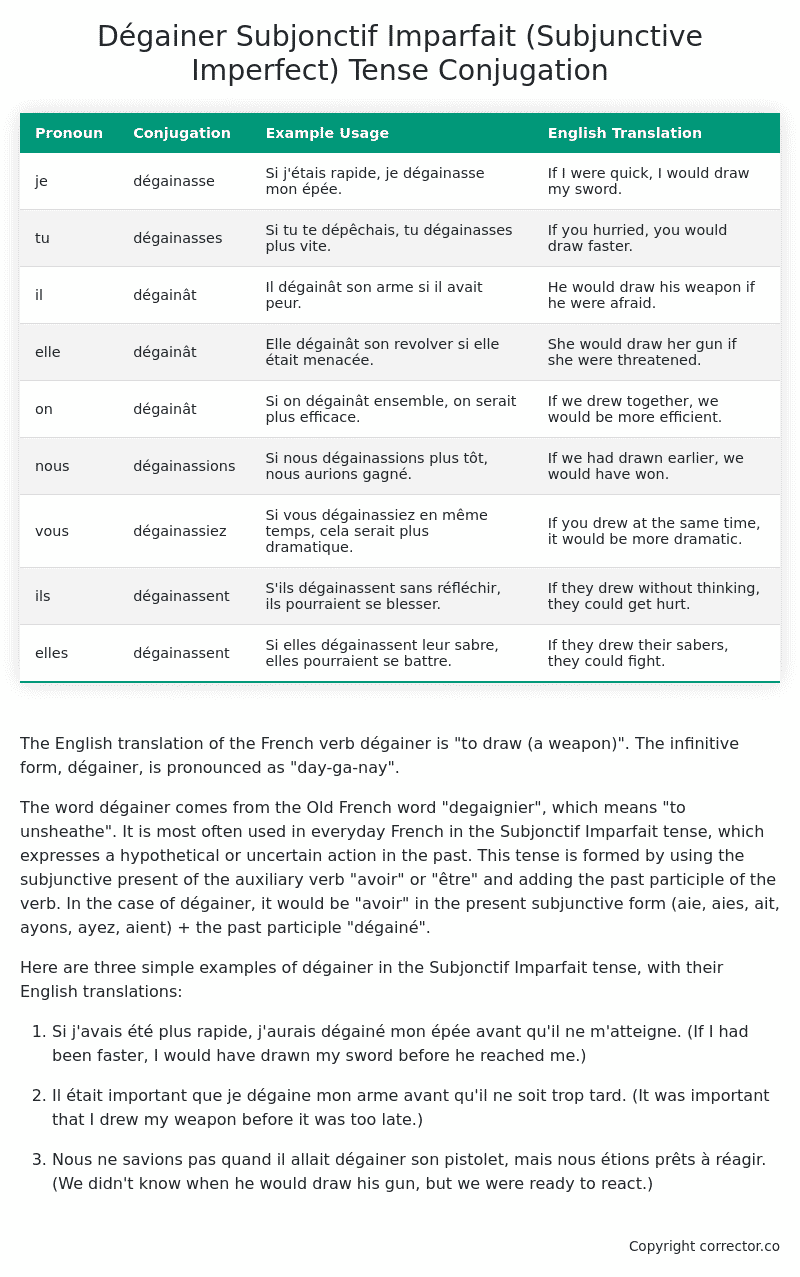Subjonctif Imparfait (Subjunctive Imperfect) Tense Conjugation of the French Verb dégainer
Introduction to the verb dégainer
The English translation of the French verb dégainer is “to draw (a weapon)”. The infinitive form, dégainer, is pronounced as “day-ga-nay”.
The word dégainer comes from the Old French word “degaignier”, which means “to unsheathe”. It is most often used in everyday French in the Subjonctif Imparfait tense, which expresses a hypothetical or uncertain action in the past. This tense is formed by using the subjunctive present of the auxiliary verb “avoir” or “être” and adding the past participle of the verb. In the case of dégainer, it would be “avoir” in the present subjunctive form (aie, aies, ait, ayons, ayez, aient) + the past participle “dégainé”.
Here are three simple examples of dégainer in the Subjonctif Imparfait tense, with their English translations:
-
Si j’avais été plus rapide, j’aurais dégainé mon épée avant qu’il ne m’atteigne. (If I had been faster, I would have drawn my sword before he reached me.)
-
Il était important que je dégaine mon arme avant qu’il ne soit trop tard. (It was important that I drew my weapon before it was too late.)
-
Nous ne savions pas quand il allait dégainer son pistolet, mais nous étions prêts à réagir. (We didn’t know when he would draw his gun, but we were ready to react.)
Table of the Subjonctif Imparfait (Subjunctive Imperfect) Tense Conjugation of dégainer
| Pronoun | Conjugation | Example Usage | English Translation |
|---|---|---|---|
| je | dégainasse | Si j’étais rapide, je dégainasse mon épée. | If I were quick, I would draw my sword. |
| tu | dégainasses | Si tu te dépêchais, tu dégainasses plus vite. | If you hurried, you would draw faster. |
| il | dégainât | Il dégainât son arme si il avait peur. | He would draw his weapon if he were afraid. |
| elle | dégainât | Elle dégainât son revolver si elle était menacée. | She would draw her gun if she were threatened. |
| on | dégainât | Si on dégainât ensemble, on serait plus efficace. | If we drew together, we would be more efficient. |
| nous | dégainassions | Si nous dégainassions plus tôt, nous aurions gagné. | If we had drawn earlier, we would have won. |
| vous | dégainassiez | Si vous dégainassiez en même temps, cela serait plus dramatique. | If you drew at the same time, it would be more dramatic. |
| ils | dégainassent | S’ils dégainassent sans réfléchir, ils pourraient se blesser. | If they drew without thinking, they could get hurt. |
| elles | dégainassent | Si elles dégainassent leur sabre, elles pourraient se battre. | If they drew their sabers, they could fight. |
Other Conjugations for Dégainer.
Le Present (Present Tense) Conjugation of the French Verb dégainer
Imparfait (Imperfect) Tense Conjugation of the French Verb dégainer
Passé Simple (Simple Past) Tense Conjugation of the French Verb dégainer
Passé Composé (Present Perfect) Tense Conjugation of the French Verb dégainer
Futur Simple (Simple Future) Tense Conjugation of the French Verb dégainer
Futur Proche (Near Future) Tense Conjugation of the French Verb dégainer
Plus-que-parfait (Pluperfect) Tense Conjugation of the French Verb dégainer
Passé Antérieur (Past Anterior) Tense Conjugation of the French Verb dégainer
Futur Antérieur (Future Anterior) Tense Conjugation of the French Verb dégainer
Subjonctif Présent (Subjunctive Present) Tense Conjugation of the French Verb dégainer
Subjonctif Passé (Subjunctive Past) Tense Conjugation of the French Verb dégainer
Subjonctif Imparfait (Subjunctive Imperfect) Tense Conjugation of the French Verb dégainer (this article)
Subjonctif Plus-que-parfait (Subjunctive Pluperfect) Tense Conjugation of the French Verb dégainer
Conditionnel Présent (Conditional Present) Tense Conjugation of the French Verb dégainer
Conditionnel Passé (Conditional Past) Tense Conjugation of the French Verb dégainer
L’impératif Présent (Imperative Present) Tense Conjugation of the French Verb dégainer
L’infinitif Présent (Infinitive Present) Tense Conjugation of the French Verb dégainer
Struggling with French verbs or the language in general? Why not use our free French Grammar Checker – no registration required!
Get a FREE Download Study Sheet of this Conjugation 🔥
Simply right click the image below, click “save image” and get your free reference for the dégainer Subjonctif Imparfait tense conjugation!

Dégainer – About the French Subjonctif Imparfait (Subjunctive Imperfect) Tense
Formation
Common Everyday Usage Patterns
Interactions with Other Tenses
Subjonctif Présent
Indicatif Passé Composé
Conditional
Conditional Perfect
Summary
I hope you enjoyed this article on the verb dégainer. Still in a learning mood? Check out another TOTALLY random French verb conjugation!


